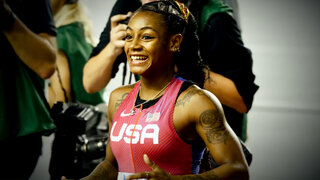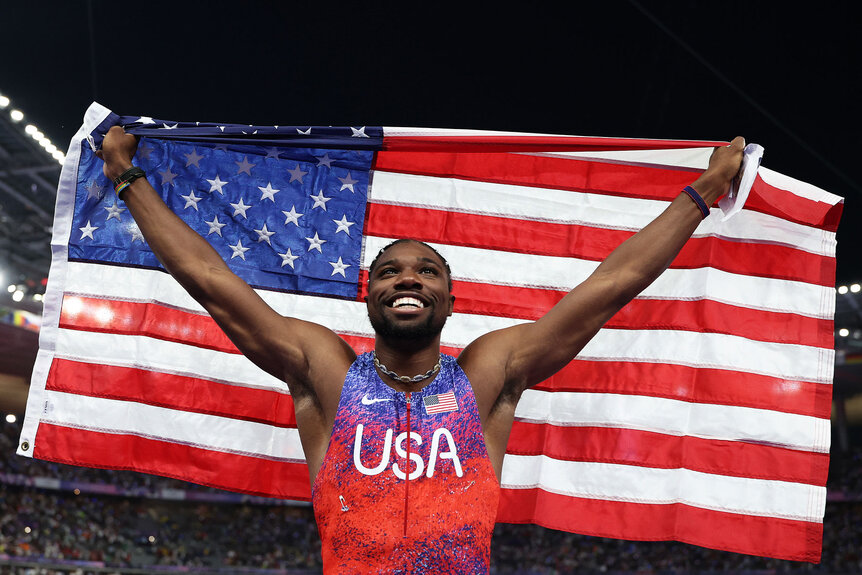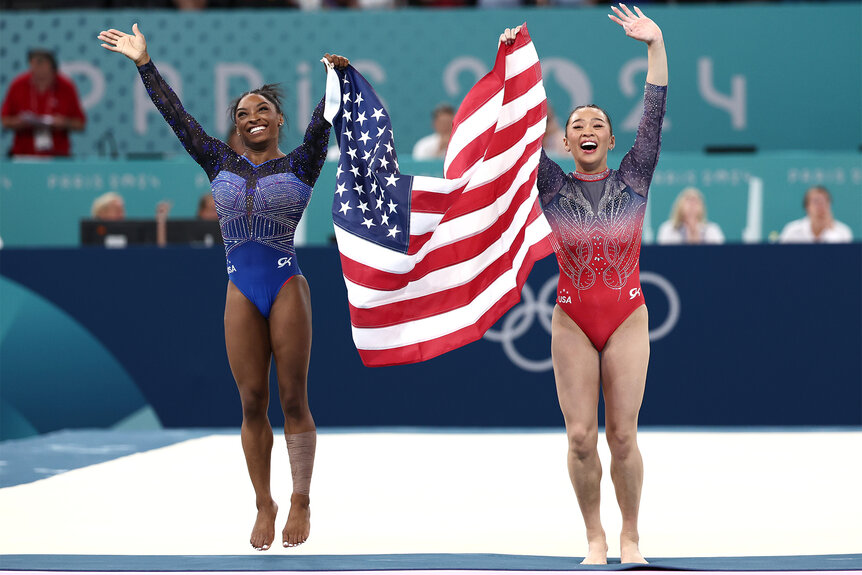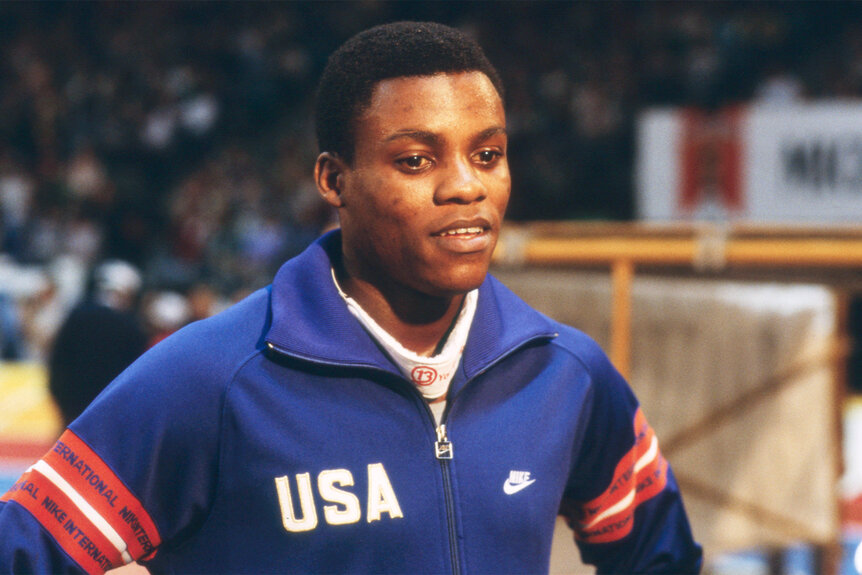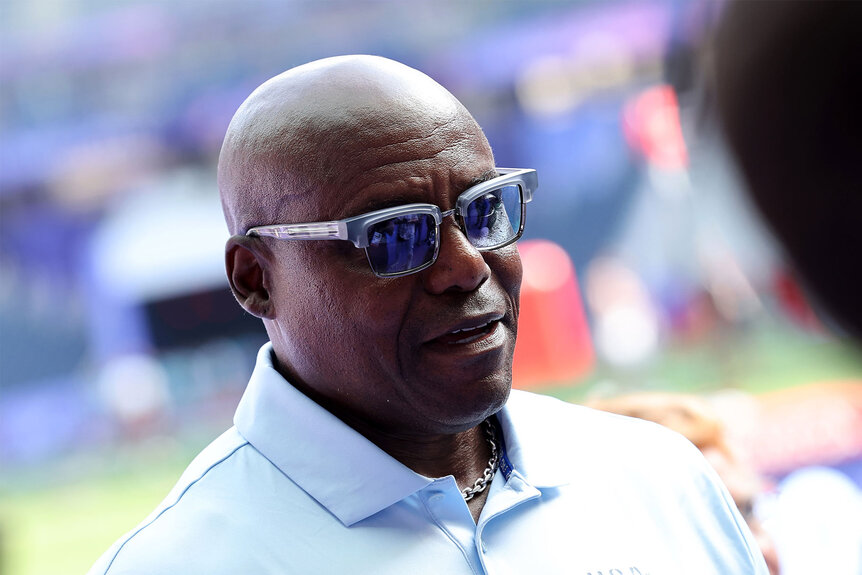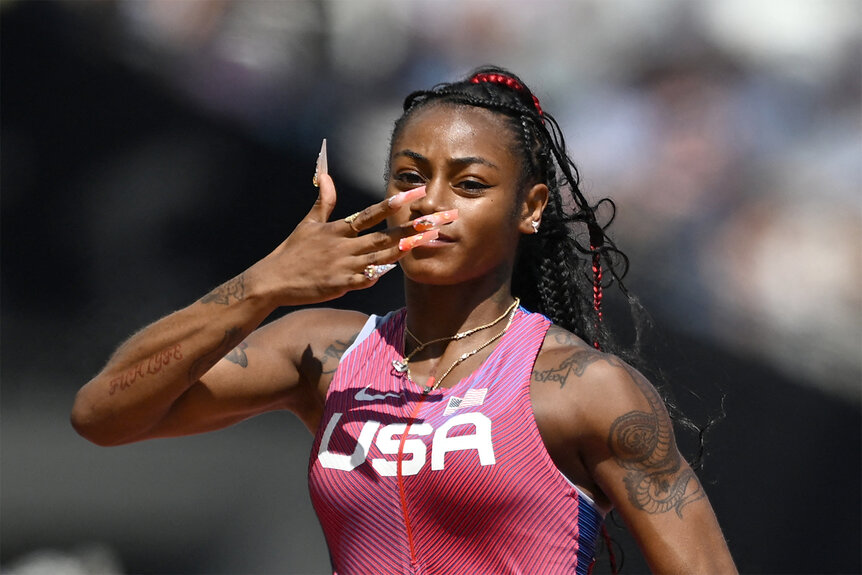Carl Lewis Celebrates Team USA's Wins in Track & Field: "It's Really Special"
The Team USA Olympic legend details how America’s two superstars can lead track & field to the promised land, while breaking down the pressures of the sport.
For most of us, the monotony of the daily grind is taxing to say the least. That’s because, though we’re told to pick a career we enjoy and can see ourselves participating in for the long haul, the truth of the matter is that we often find ourselves spiraling deeper down a path where the push and pull of happiness to disappointment is a never-ending battle, inching us closer and closer to a reward of fulfillment… if we’re lucky. That said, it’s not a universal truth, and talking to Carl Lewis couldn’t illuminate that fact any more clearly.
Behind his effervescent personality and a radiant smile more blinding then most high beams, Lewis is the type of person who attacks every day with seemingly just a little more zest than the previous one, always with an eye toward lending a helping hand where needed or guiding those that require guidance, when called upon. And right now, there’s nowhere that needs him more than the 2024 Summer Olympic Games in Paris, France. It’s here across the pond, away from home and alongside Team USA that the living legend is supporting an American track and field squad featuring the superstar duo of Sha’Carri Richardson and Noah Lyles that Lewis says is capable of taking the sport to new heights.
RELATED: All About Track and Field Star Sydney McLaughlin-Levrone's Impressive Olympic Career
Noah Lyles, Sha’Carri Richardson Leading the Charge
As one of only four Olympic athletes to win nine gold medals, Carl Lewis knows just how meaningful it is for Team USA track and field to be anchored by the phenomenally talented Sha’Carri Richardson and Noah Lyles — two athletes who are not only capable, but also comfortable shouldering the immense weight of an entire nation’s expectations.
“The 100 meters is popular, because it's so simplistic… And if you make one mistake you lost,” says Lewis to NBC Insider. “So, that's what I think elevates that event. And both [Richardson and Lyles] can win here. They're both defending champions; they’re both the fastest people in the world right now. …And I think that both of them are people that could do what it takes to help elevate the sport.”
RELATED: Cole Hocker’s Family Has the Best Reaction to His Win in the Men’s 1500m (VIDEO)
Lyles and Richardson are no strangers to lighting up the track with their electrifying performances, but now both, like Lewis said, are helping to elevate their sport away from the competition with a myriad of brand partnerships. If anyone knows about their commercial appeal, it would be Lewis, who shared the screen with Lyles in a comical ad for Tide’s “Stains Happen to the Best of Us” campaign — an irreverent reminder that life gets messy, on and off the track.
Though Lyles wound up winning the gold in the 100m for Team USA — and nabbed a bronze in the 200m — Richardson’s triumph in the 100m event was derailed by an incredible performance by underdog Julien Alfred, who captured the gold for St. Lucia. Despite Richardson coming up short in that event, Lewis highlights the importance of having an athlete of her superb caliber on the team for the Americans.
“It's really important to have a superstar,” Lewis adds. “And a female [one] in this sport is great because women's track and field was incredible. And so, to have two superstars in one of the most popular events enables them to have not only the power, but the opportunity to push to grow the sport and make changes that the sport needs that people could get on board with.”
Lewis Applauds "Champion" Simone Biles
When viewers see athletes like Simone Biles and Jordan Chiles bowing down to Brazil’s Rebeca Andrade during the medal ceremony for the women’s gymnastics floor exercise final, or sprinter Silna Pha Aphay running to assist her fellow competitor Lucia Moris from the South Sudan, we’re immediately reminded of the virtues instilled within the Olympics: unity, camaraderie, equality and sportsmanship. These themes aren’t just reserved for the Games’ competition either as they’re symbolic of what a unified world could be — a reason that Lewis, like many, sees the 2024 Paris Games as one of the most consequential Olympiads ever.
“The Olympics stops the world, and that's the great thing about it,” states Lewis. “It brings people together. It gives people a sense of pride.”
Despite political volatility, economic woes, and multiple wars, in the face of such robust, divisive threats, the Olympics and the ubiquitous positivity pouring out from the Games, Lewis notes, are galvanizing forces unlike any other and the perfect medicine for a society growing more and more fractured by the day.
“If you don't know anyone, you can still root for USA,” Lewis adds. “You could never know Simone Biles or anything like that. But you're like, ‘Boy, she came back, and she came back with grace.’ And she's a champion again. And America won the trophy again, to be the number one team in the world. It hasn’t been done in such a long time.”
“It's just that type of event that's rare in the world, [and] probably, there's no other event in the world like it anymore," he remarks.
Carl Lewis' Standout Races
So much that goes into a lifetime of Olympic training and competing all boils down to a matter of moments — very, very small moments. Fractions of a second here, fractions of a second there, the gamut spanning greatness to failure is sometimes a matter of near inexplicable minutia as Noah Lyles discovered, upon winning the 100m by 0.005 of a second. Those are the moments fans go wild for and that make watching track and field so compelling.
But for athletes like Carl Lewis, whose four gold medals in the long jump make him one of only three Olympians to win the same individual event at four different Games, his standout memory didn't even happen at the Olympics.
“For me, it was the year before the Olympics, when I won all three of the national championships in the 100, 200 and long jump my first time,” Lewis recalls. “I knew then, that, ‘Wow, you have an incredible talent. And you can win this thing next year. And if you win in Los Angeles at your home country, you're going to be a global superstar.’”
“That was when it really clicked, and it wasn't like, ‘Man, I made it as a superstar.’ It's just impossible to not understand what's going to come from winning four gold medals at the Olympic Games in your home country. So, that was really that day in Indianapolis in 1983," he says.
On the Pressures of Competitions
As much as our Olympic heroes strive for the type of greatness Carl Lewis witnessed he was capable of that day in 1983, as he explains, the most difficult part about being an elite Olympian is the desire to always top the competition.
“The hardest thing is, and I guess the easiest way to describe that… when I became number one in the world and 100 meters, I was 19, and I ran 10:00,” notes Lewis. “When I was number one in the world in 100 meters the last time, I was 30, and I ran 9:86. So, you have to play 'keep away.' You can't say, ‘I'm number one’ because then someone's gonna beat you. You have to say, ‘I'm running faster every year.’ So, it was keep away.”
RELATED: Why Does Olympic Runner Gabrielle Thomas Wear a Sleeve?
He adds, “That's the challenging part about staying motivated to do that, especially in an event in the 100 meters per se where, in a split second, if you make a mistake, you’ve probably lost. Make a mistake at the blocks, [and] you're thinking about 99 meters of, ‘I cannot believe that; I'm so mad. I missed that.’”
Moving forward, he says he changed his approach to “focusing on excellence – what is the best me I could be? And so, that's what I challenged [myself].”
What does Carl Lewis do now?
For Carl Lewis, one of America’s most storied Olympic athletes, who matched his idol Jesse Owens by winning gold in the 100m, the 200m, the long jump, and the 4x100m relay at the 1984 Los Angeles Games, his view of the Olympics continues to take on greater purpose as his coaching career continues to evolve. Now a coach at the University of Houston, Lewis has multiple athletes competing in the Games, making the experience of being on the ground in Paris even more surreal.
“Well, it's a unique time… I have three athletes that are competing,” opines Lewis. “And just a couple of years ago, I was just thinking, drifting in practice. And I said, ‘You know, I started in track, because our mother wanted girls have access’ — she started a girls track team in 1969. So, now I'm doing what they did, so now I’ve become my parents.”
“And then, the other person I respect the most in my sport, and one of my favorite people in the world is Tom Tellez, my coach, my only coach my entire career. And now, I'm at track meets being my parents and Tom Tellez," he reflects.
The irony of Lewis’ career in track and field coming full circle isn’t lost on him, nor the high regard in which he views the Games.
“For me, it's incredible,” he adds. “I mean, I never would have thought, I've never wanted to coach and here we are. And I'm in my 10th year, I started in my 50s. And in my 10th year, being able to mentor these young people, great kids. And so the Olympics is multiple things to me. It's enjoying the experience. …It's really special for me.”
Track and Field in a Post-Olympic World
With Simone Biles’ triumphant performances sadly now behind us, all eyes remain on track and field and the dominance of Team USA, who’ve gobbled up six gold medals, 11 silvers and seven bronzes as of Thursday. And yet, people can't help but wonder what the future holds for the sport.
“It’s a complicated question because there are, you know, competing factions, and things that we need to be sorted out,” details Lewis. “I know Michael Johnson just has his new league that he's coming out with. He's bringing $30 million in that league into the sport. …My wish is World Athletics, our organizing organization just says, ‘Hey, this is great.’…But right now, it is complicated because we don't have enough events to really support the athletes that are here.”
“And track and field, what makes it more difficult, and it's no one's fault, but it is what it is, is that there's no definite league… there's no definite team and no definite number,” he continues. “So, anyone who wants to be a pro is a pro, [and] now you have a sport with way too many people.”
“Could you imagine if the NFL did not have a finite number of athletes or the NBA?” Lewis asks. “They'd be everywhere. So, I think that's something we're gonna have to work on. And then once we do that, and get things like what Michael’s doing, and other people are doing to infuse some cash into the sport, so that the powers that be — the bigger sponsors and the bigger corporations and television networks — say ‘Hey, I want to get involved with that.’ And that's how I see it growing.”
